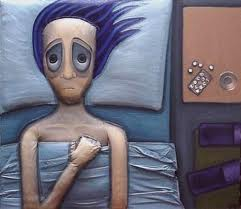Are you tired of waking up repeatedly in the middle of the night? Do you struggle to fall back to sleep? Do you frequently wake up tired and moody, even though you slept for eight hours or more? If so, then the chances are that you are not getting enough of the good stuff, and the secret lies in quality, deep REM sleep. You do not need to learn how to live with insomnia. Here are seven useful sleep hacking tips that will help you wake up fresh and energized day after day
Give The Aura A Try
Aura is a device designed to analyze and record details related to your sleep environment, such as the light level, the overall room temperature throughout the night or the amount of noise pollution, while providing you with a melatonin-stimulating orange light along with soothing frequencies designed to restore the balance of your body’s natural circadian rhythms. In other words, Aura is specifically designed to create the perfect sleeping conditions, and the best thing about it is that you can easily place the sensor under the mattress to monitor your heart rate, your breathing cycles or your sleep patterns at the same time. See The Aura here
BluBlocker Glasses
Recent studies have revealed that those who use gadgets such as tablets, laptops and smart phones just before going to bed are likely to need more time to fall asleep, as opposed to those who do not. Statistically speaking, one in ten Americans look at their screen before bed, and the high concentrations of blue light emitted by these devices take their toll on the natural production of melatonin, the hormone responsible for inducing sleep. This is where the BluBlocker glasses step in – their amber lenses simply shield your eyes from this bothersome light, thus preventing it from interfering with your melatonin. You can find BluBlocker glasses here
Eat Only Low-Glycemic Index Foods Before Bed
You are what you eat – we have all heard that countless times. However, the truth is that your dinner can make or break your night’s sleep, and nutritionists advise us to eat tryptophan-rich foods (such as turkey or chicken) before bed, along with low-glycemic index foods in very small quantities. Low blood sugar is one of the main culprits behind morning fatigue and headache, and the good news is that you can easily prevent that by eating some almond butter, a yoghurt or an apple right before you go to bed. Also high on the list if friendly sleep food are fish (especially halibut, salmon and tuna), Jasmine rice, Cherry juice, Kale (you can make delicious kale crisps..http://allrecipes.com/recipe/baked-kale-chips/) and bananas.
Try Phillips Wake-Up Light Plus
The sleep-related technology has sky-rocketed over the past several years, and the Phillips Wake-Up Light Plus is certainly one of the most sought-after gadgets amongst those who have a hard time sleeping at night. In a nutshell, the device aims to mimic the light of the rising sun while generating soft and very pleasant natural sounds that will slowly help you wake up. The reason why we hate alarms so much is because they wake us up so abruptly – Phillips Wake-Up Light Plus has a radically different mechanism of action, and the latest model even has a dusk simulator embedded in it!
Use White Noise To Address Noise Pollution
One of the main reasons why people have a hard time falling asleep (and staying asleep throughout the night) is because of the noise pollution that lingers in the room. Researchers have shown that white noise, or nature sounds, can tackle this bothersome noise pollution that is often generated by road traffic, neighbors and such. The Marpac Dohm is still considered to be the Daddy of all white noise machines. Find White Noise machines here
Light Therapy
Light therapy has been used for years to treat disorders related to the circadian rhythm, such as seasonal affective disorder or delayed sleep phase disorder. Also referred to as Heliotherapy or Phototherapy, red light therapy involves the exposure to polychromatic polarized light for a limited period of time, thus stimulating sleep.
SleepGuard for Bruxism
Lastly, Are you a grinder? A recent survey suggests around 8% of us grind our teeth in our sleep..and that’s only those that have reported it. Among problems such as headaches, jaw tension, and dental trouble, tooth grinding interferes with the quality of sleep. SleepGuard is a state of the art biofeedback monitor designed for those who grind or clench their teeth. This is a headband monitor that sends out beeping sounds throughout the night, each time you grind your teeth – the harder you clench them, the louder the sound signal. The sound is strong enough to let you know, yet gentle enough not to wake you up, and the entire mechanism is based on the principle of subconscious brain training. Read about the SleepGuard here

